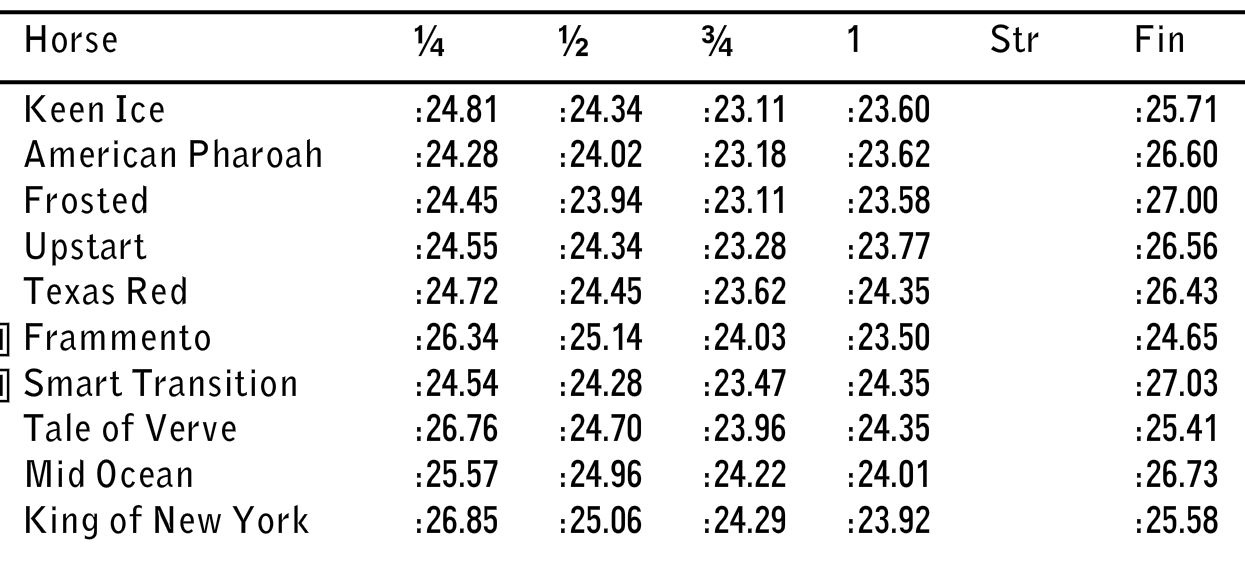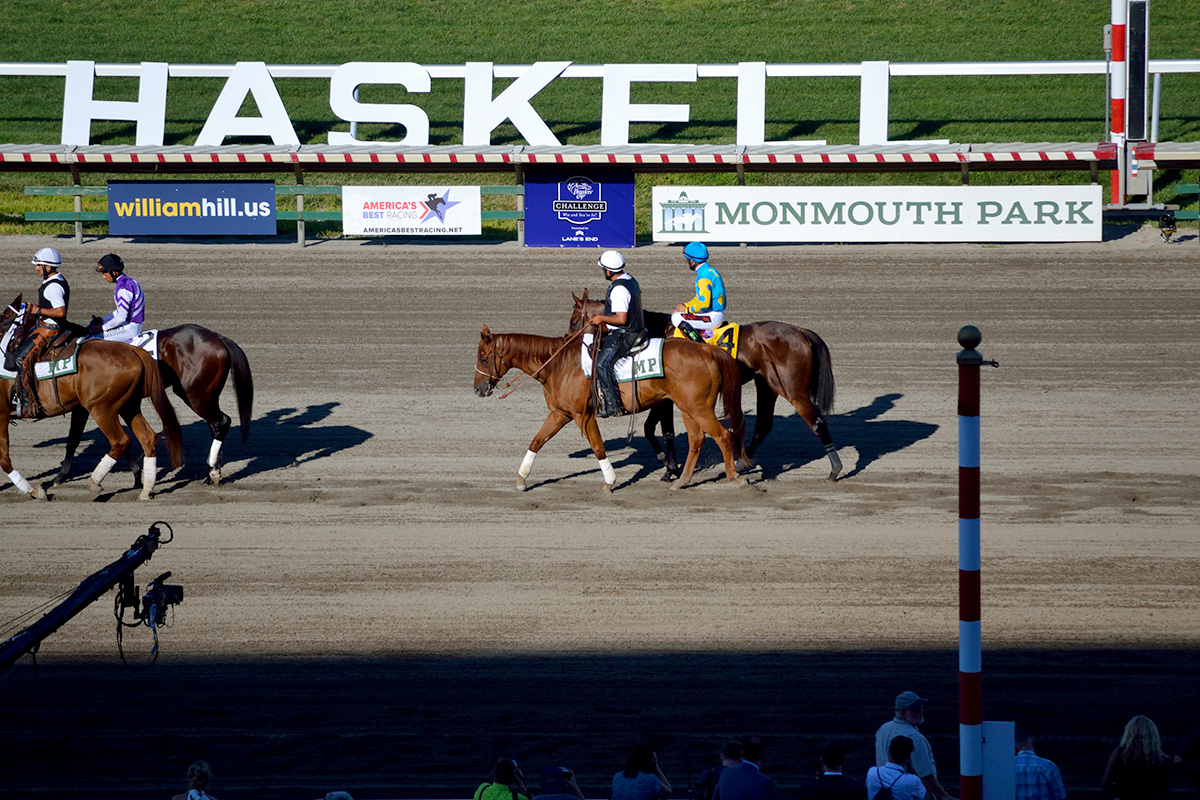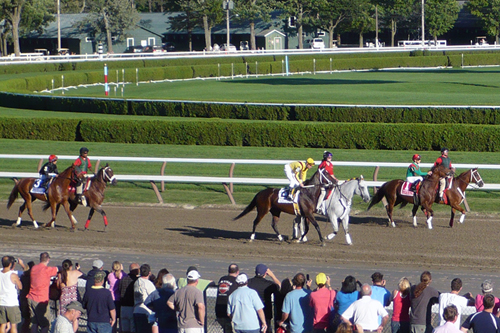Travers Stakes

Frosted and American Pharoah, on the rail, turn into the stretch of the Travers Stakes. Keen Ice is to the outside. Photo credit: Arianna Spadoni/NYRA
Steve Haskin had concerns before the Travers Stakes. Gary West felt a shiver of apprehension. Trainer Bob Baffert thought the Pennsylvania Derby was, possibly, better timing for the Triple Crown winner. “I just hope I don’t have to say, I should have gone to Parx,†he said to Sean Clancy. He had been leery of bringing American Pharoah to Saratoga: “I don’t want to find any Onions.”
In the air-conditioned chill of his family’s Saratoga clubhouse box, awaiting the Travers, Justin Zayat predicted the future:
“What is everyone expecting right now? They’re expecting Pharoah to win. My experience in racing is when everyone is hoping for something, it never happens.”
When did American Pharoah lose the Travers? He came out of the gate well and went to the front. So far, so good. He clipped off :12 second furlongs through the first half, just as he had in the Belmont Stakes. But he wasn’t alone. Frosted was to his outside, and as they moved down the backstretch, the gray pressed for more speed. Trakus records them as running the same time in the third quarter — an even :23 seconds. “Frosted is taking it to him,” called Larry Collmus. More than four lengths back, Keen Ice was matching their velocity.

DRF incremental times for the Travers / View the official Equibase chart (PDF)
Turning into the stretch, Frosted crowded Pharoah on the rail. At the top of the stretch, Frosted headed Pharaoh. Jockey Victor Espinoza alleged rider Jose Lezcano, who had picked up the mount on Frosted after Joel Rosario went down in the Forego Handicap, was being aggressive, reports David Grening:
Espinoza claimed he felt Frosted’s chest hit his horse’s hip, and “he turned me sideways,†altering American Pharoah’s stride. Espinoza said Frosted hit him five or six times, though replays don’t bear that out.
Said Lezcano: “He started to get out a little bit, and he touched my horse. I never crossed the line. I never touched him.â€
American Pharoah dug in and took the lead again. It didn’t look easy for the 1-5 favorite. It didn’t look as though he had much left. He had shown the same heart at Churchill Downs, fought to get past Firing Line in the final yards of the Kentucky Derby as Espinoza wildly asked him for more with reins and whip, but the reserve he had on the first Saturday in May was missing.
“After he finally shook Frosted off, I really thought, well, maybe there’s a chance,” said Baffert in the post-race press conference. “He just fought back valiantly, and he just — it wasn’t his day today.”
It was Keen Ice’s day. The maiden winner had finished seventh in the Kentucky Derby, third in the Belmont Stakes, second in the Haskell. He was rising, and his rider, following trainer Dale Romans’ instructions to put him in the race, wasn’t about to miss an opportunity for a win.
“I just kept tracking and following with them,” said Javier Castellano. “At some point when turning for home, I saw the horses slow down and start coming back to me so I knew that I had a chance to win the race.”
Keen Ice passed both to win the Travers by three-quarters of a length over American Pharoah in a final time of 2:01.57. The 16-1 shot paid $34.
“Maybe it’s just arrogance, but I felt good about today, I really did,” said Romans. “He had just trained too good. I knew he was going to run really big and I just couldn’t imagine Pharoah taking another step forward.”
He didn’t, if Beyer or TimeformUS speed figures are your measure — he ran at about the same level he has been this year. Keen Ice was given a Beyer speed figure of 106 for the Travers, which would make American Pharoah’s 105, the same as he ran in the Kentucky Derby. TimeformUS rated American Pharoah 128 (Keen Ice 127), in line with his Derby 127.
American Pharoah is consistent — for that matter, so is this crop. Along with Keen Ice, how Frosted and Upstart — fourth in the Travers and third in the Haskell — ran validates the results of earlier races and confirms what so many were saying before the Kentucky Derby about the depth of the this year’s field. Chaos would have been Mid Ocean jumping up for a win; these 3-year-olds are running true to their demonstrated abilities and following form cycles. Yet we’ve come to expect so much of the Triple Crown winner, that a solid second, on a day he clearly he wasn’t feeling at his peak, or didn’t like the track, or got a little hot and bothered by the crowd, is a letdown:
These horses, they will fool you. We tend to become so infatuated with them that we start to believe they are invincible, that all you need to do is put the saddle on them, turn on the ignition and watch them motor around the racetrack on their way to once again dominating those silly enough to get in the starting gate with them. We lose our sense of logic.
But sooner or later, we find out there are no perfect horses.
Dejected owner Ahmed Zayat suggested after the Travers that his homebred colt would be retired. “My gut feeling is if this horse is one percent not the American Pharoah that we cherish, that’s it. The show’s over.”
Mike Watchmaker would be okay with that: “… let’s be honest: The American Pharoah we saw Saturday just was not the same American Pharoah we saw in all of his previous races this year.”
Tim Layden likened the aftermath of the Travers as a muffling of what “has been a racing season defined by living sound.” (What that sounds like.)
Oh, and the winner? His people are celebrating. “Allen told me he never once felt sorry about beating Secretariat,†said Romans to Mike Welsch, referring to the late trainer Allen Jerkens, who won the 1973 Whitney with Onion:
“And I started thinking about Allen and that conversation as soon as my horse crossed the finish line in front of American Pharoah. And you know, I don’t feel sorry either.â€
Onions can be sweet.

Amanda Duckworth on the American Pharoah effect:
[Monmouth Park] also posted an all-sources handle of $20 million, which is a non-Breeders’ Cup record. The Haskell alone brought in a record $6.54 million, shattering the mark of $4.4 million bet on the 2010 edition. To anyone who questioned why the track bumped the purse of the race from $1 million to $1.75 million, that is your answer. American Pharoah brings in people, betting dollars and a great deal of mainstream exposure. That’s a pretty great trifecta for the sport.
NYRA wants to see that kind of action on the Travers Stakes, and is trying to lure the colt’s connections with a promise to raise the Travers purse to $1.6 million, up from $1.25 million, if American Pharoah follows his Haskell win with a Saratoga appearance. Owner Ahmed Zayat wants to go. “My preference would be to run [next] at Saratoga,” Zayat told Bob Ehalt. “If it’s up to me, it would be the Travers,” he said to Ron Mitchell. “I have made my desires known to my trainer. He knows what I want.” Trainer Bob Baffert says that’s the case, and that Zayat is deferring a decision on the Triple Crown winner’s next race to him. “[T]his is true and accurate statement,” Zayat confirmed with a tweet.
Baffert’s not committing for now: “It’s way too early to say anything.”
This is an interesting little dilemma for owner, trainer, and Coolmore, who will stand the big horse at stud. Sid Fernando’s been dissecting the conflict and incentives via his Twitter stream, discussing the almost-certain “kicker” for winning the Travers (essentially a performance bonus), built into the breeding rights deal Zayat and Coolmore negotiated.
In the scramble for American Pharoah’s next start, the Travers seems to have moved ahead of the Pennsylvania Derby, which is the race I thought he’d point to next, given the likely purse boost, appearance fees for owner and trainer, and Baffert’s lack of interest in running the colt against older horses before the Breeders’ Cup Classic. Parx racing director Sam Elliott has been working hard to sell his race, traveling to Churchill Downs, Santa Anita, and Monmouth Park in pursuit, but Zayat has said “No Penn Derby” and ruled out the Pacific Classic as well — “zero shot!! Timing doesn’t work.” Elliott was at the Haskell on Sunday — I hope he didn’t get the Pennsylvania Derby news on Twitter too.
Mike Pegram, a long-time owner with Baffert, was blunt about the where-next question. “They’ll go where the money is,” he told Ed Zieralski. The Travers’ historic significance plus the added money makes a sweet exacta.
Odds and ends: American Pharoah was given a Beyer speed figure of 109 for the Haskell … Upstart will point to the Travers after running third to the Triple Crown winner on Sunday in his first start since finishing last in the Kentucky Derby. “I was miserably impressed,” trainer Rick Violette said of the Haskell winner … Monmouth reported attendance of 60,983 for Sunday’s race, a figure Chris Rossi calls into question by comparing per-attendee handle for the Haskell since 2000 (chart here, if you follow him on Twitter). This year’s $48.58 is the lowest average in that period, beating the previous low of $65.35 set in 2009. In 2014, the average was $70.29 … you can definitely rule out a possibility that probably hadn’t even occurred to you: The Eclipse Stakes winner Golden Horn will not meet American Pharoah in the Breeders’ Cup. “It’s a complete no-no, on dirt certainly,” said owner Anthony Oppenheimer.
Saratoga babies: The spreadsheet of 2015 juvenile race starters and winners has been updated through second week results (XLS).

Forgive me a bit of redboarding.
(Don’t worry, I’m not going to claim to have had Persistently. I played the undercard, passed on the feature.)
We were in our seats at Saratoga well before first post. Mr. Railbird, usually good for about three hours at the track, was considering a mid-afternoon stroll into town, and wondering, if he took that walk up Broadway, if he would regret missing the Personal Ensign.
“It’s not going to be another Woodward,” I said. “I expect her to lose.”
It was true. I could already see the finish, the head or half-length of another horse in front of Rachel Alexandra. I didn’t think it would be 21-1 Persistently, running in her first graded stakes race in two years, a result that I would only appreciate later — there’s an undeniable narrative satisfaction to the winning connections being those of the race’s namesake, dead this year at 26.
I’m a fangirl, though, and I still hoped, and when she looked to be pulling away at the top of the stretch, having put away Life At Ten with ease after a solid opening half in :47.73 and three-quarters in 1:12.02, I let out a cheer. There was a flash of her old brilliance, a moment in which she looked like the Rachel of 2009. Then came Persistently, and all was over. A tired Rachel Alexandra going 10 furlongs for the first time, needing more than :27 seconds for the final quarter, was outrun by a length. “I didn’t feel any acceleration and I got worried,” said jockey Calvin Borel. “She wasn’t really there. I knew if anyone was running behind us, we were in trouble.”
“We don’t want the magic to end.”
It’s hard to let go of what was.
A different horse, surely, but still tough and full of heart.
“The time has come to send her home.”
How silly.
With every loss this year have come more calls to retire the filly. What it is about losing that provokes this reaction? It says so much more about the human ego than it does about the horse, who’s hardly disgracing herself on track (even if it is a shame about the 95 Beyer speed figure in the Personal Ensign, ending her streak of 12 consecutive triple-digit Beyers). “I don’t want to give up on getting her back to where we were,” said trainer Steve Asmussen. And why should he? The Breeders’ Cup Classic is probably out, but with a record of two wins and three seconds from five starts, there’s no reason to think Rachel Alexandra can’t be competitive in the Distaff Ladies’ Classic.
“Her poor showing Sunday doesn’t mean that her achievements were in any way a fluke,” writes Andrew Beyer. “Her loss only demonstrates that she is flesh and blood, not a running machine.”
And still — as a friend emailed to say this morning — a hell of a horse.
Rarely is there as much dissonance between a race call and what’s happening on track as there was in the Travers Stakes. Watching the replay, the excitement in Tom Durkin’s voice as the field comes down the stretch just doesn’t square with Fly Down and Afleet Express looking for all the world like two horses at Aqueduct in February who really don’t want to pass each other while the other runners stagger behind to the wire. The final time of 2:03.28 was the slowest since 1998 (and somehow earns a Beyer speed figure of 105 for the first two finishers). Per Formulator, Afleet Express ran the last quarter in :26.44, Fly Down in :26.37. That’s just ugly. Track condition was certainly a factor. “The inside part of the racing strip was the path to victory,” notes Beyer. Gary West shares his analysis: “… the winning times on the day, when compared, don’t make any sense unless the track, for whatever reason, was slowing down. And slowing down.”
One of the more interesting juveniles running this summer is Theyskens’ Theory, a three-quarter sibling to 2005 juvenile champion Stevie Wonderboy and the first stakes winner for freshman sire Bernardini following her visually easy 1 1/4 length victory in the seven-furlong Prestige Stakes at Goodwood. The race was her third start; she won her second at Newmarket last month, going quicker than 3-year-olds on the same card. Too bad she doesn’t seem likely for the Breeders’ Cup, with trainer Brian Meehan saying that he plans to run ‘Theory’ once more this year, possibly in the Fillies’ Mile at Ascot, then shelve her until next spring. “When she strengthens over the winter she will be a top-class three-year-old.” Maybe Churchill in 2011, then?
There’s no need for competition, Ed Fountaine writes:
NYRA should embrace the Haskell — which is, after all, merely a prep race for the marquee event of the Saratoga meet, the 141st Travers Stakes on Aug. 28. Since the same all-star horses that face off at Monmouth on Sunday will renew their rivalry in the “Midsummer Derby,” NYRA should start beating the drums now. Advertise that the local fans can watch and bet on the Haskell at Saratoga on Sunday. Show the race on the infield TV screens. Turn the tables on Monmouth Park by using their signature race to promote yours.
Especially if you’re NYRA, and you’re likely to win the numbers game: The test of Monmouth’s “elite meet” handle figures was always going to be the opening of Saratoga. Friday, when the Spa kicked off its 40-day meet, the New Jersey track took in $5,515,194, a decline of 20% from $6,898,633 the previous Friday, while attendance remained roughly the same. Sunday, Monmouth was down 11% compared to the previous Sunday. Saturday was the odd day out, as Haskell day will certainly be next weekend. With the Lady’s Secret and Rachel Alexandra featured, handle was up 25% and attendance up 37%, which tracked nicely with on-track handle, up 35% over the previous Saturday.
At Saratoga, the first four days of this year’s extended meeting have been declared satisfactory: “Average all-sources handle, wagers on Saratoga races both on-track and from simulcast outlets nationwide, came to $12,834,190 daily, for a total of $51,336,758.” Attendance averaged 18,133 per day.
Copyright © 2000-2023 by Jessica Chapel. All rights reserved.